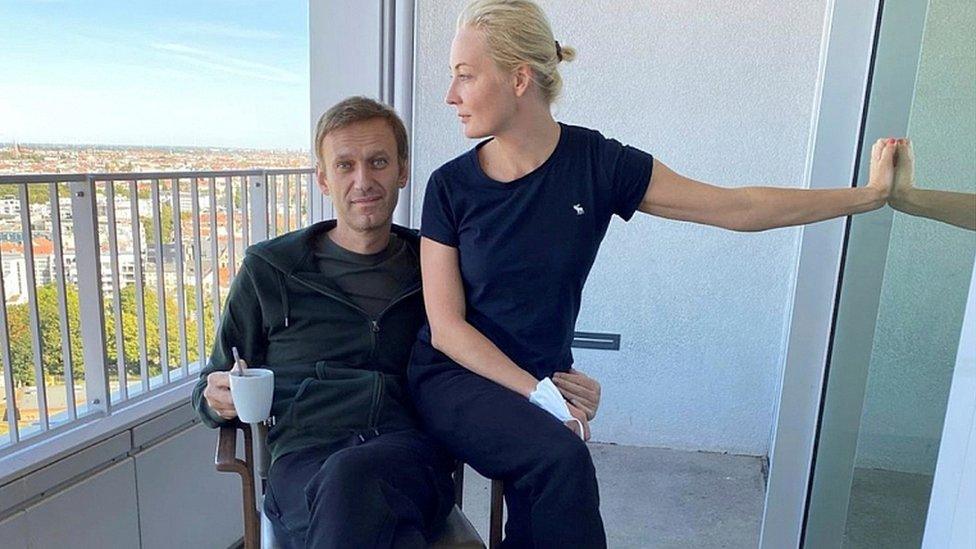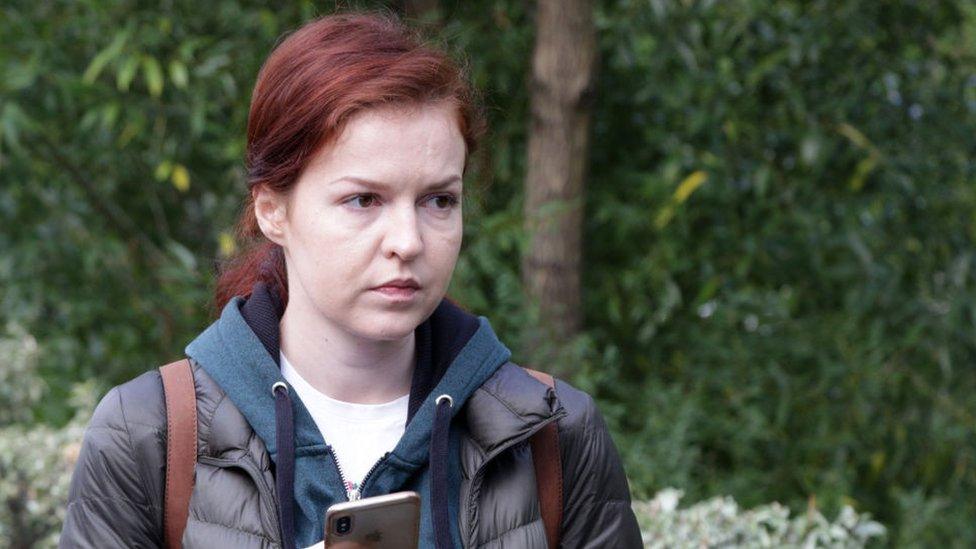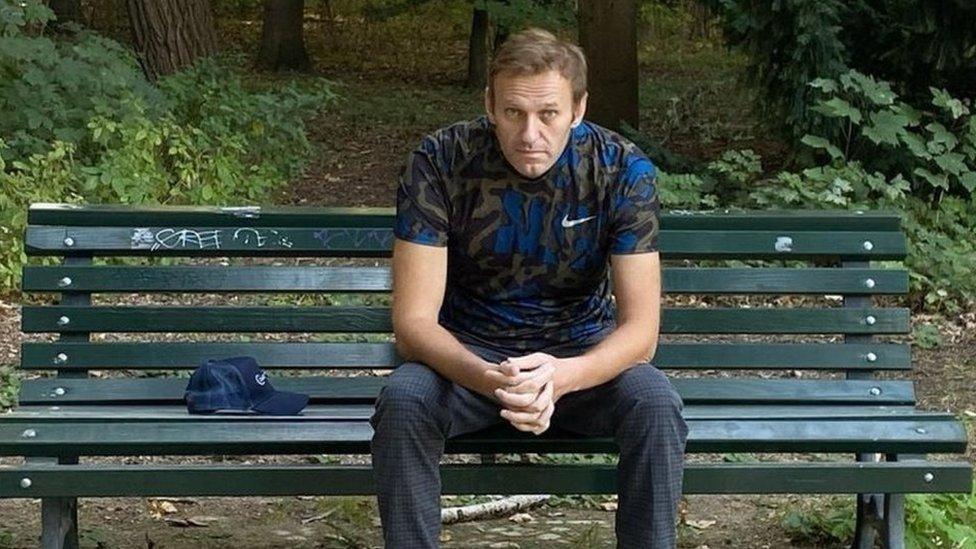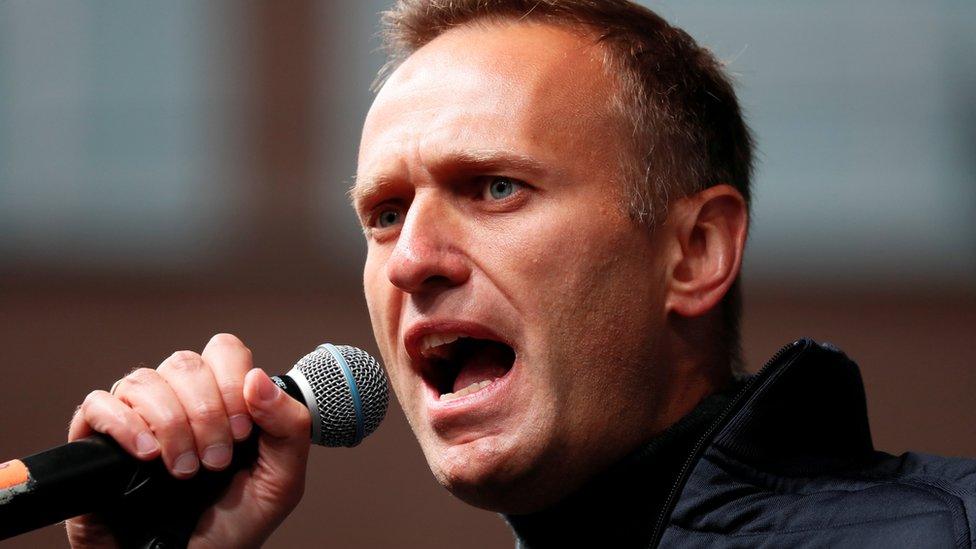Alexei Navalny has 'bank accounts frozen and flat seized'
- Published

Alexei Navalny and his wife, Yulia Navalnaya, were pictured at the hospital in Berlin
Russian opposition figure Alexei Navalny has had his bank accounts frozen and flat seized after a court order, his spokeswoman says.
A day earlier he was discharged from a hospital where he was being treated for Novichok nerve agent poisoning.
"They seized the assets and the apartment of a person who was in a coma," Kira Yarmysh said.
His team accuses President Vladimir Putin of ordering the poisoning, something the Kremlin strongly denies.
The leading opposition figure and vocal critic of Mr Putin collapsed on a flight in Siberia on 20 August, and was later transferred to the Charité hospital in the German capital Berlin for treatment.
Germany's government said laboratories in France and Sweden had reconfirmed German tests showing that the poison used on Mr Navalny was a Novichok agent, and numerous governments have demanded an explanation. The Kremlin however has said there is no proof of that.
After Mr Navalny was discharged on Wednesday, Kremlin spokesman Dmitry Peskov said he was "free" to return to Moscow "at any moment", and wished him "a speedy recovery".
Why have his assets been seized?
Ms Yarmysh said officials had seized the opposition activist's assets on 27 August, including his three-bedroom apartment in the south-east of the Russian capital, Moscow.
"It means the flat cannot be sold, donated or mortgaged," Ms Yarmysh said in a video posted on Twitter, external.

Kira Yarmysh photographed outside Omsk hospital where Mr Navalny was first taken after falling seriously ill
The move comes after a lawsuit was filed by the Moscow Schoolchild catering company, owned by wealthy Russian businessman Yevgeny Prigozhin, nicknamed "Putin's chef".
Mr Navalny, his Anti-Corruption Foundation (FBK) and an associate made a video questioning the quality of their products after a food poisoning outbreak in Moscow's schools in 2018.
But in October 2019 a court ordered them to delete the video and pay 88 million rubles ($1.1m; £900,000) in damages for libel, saying they had caused the company moral damage.
On Wednesday, Mr Prigozhin released a statement saying that if Mr Navalny "goes to meet his maker, then I personally do not intend to pursue him in this world".

Escaped death but still pursued by Russian courts
Analysis by Oleg Boldyrev, BBC Russian, Moscow
Alexei Navalny narrowly escaped death by Novichok poisoning just over a month ago, but in Russia it's business as usual - the courts are still after him.
Last year he published an investigation into food supplies to Moscow schools, alleging safety breaches.
The investigation pointed the finger at firms linked to Yevgeny Prigozhin, a shadowy businessman with interests in many fields: from catering for banquets in the Kremlin, to food supplies for the army and secondary schools, and - as is widely suspected though denied by the Russian authorities - to running private military companies which guard Russian interests in Syria, Libya, and some African countries.
Mr Prigozhin sued Mr Navalny for defamation and was awarded compensation totalling more than $1m. An ordinary flat in the southern outskirts of Moscow owned by Mr Navalny is not worth anything near that much.
The Anti-Corruption Foundation set up by the opposition politician says it will need to re-structure, but will continue to investigate corrupt Russian politicians despite this financial blow.

What's the latest on Mr Navalny?
Mr Navalny was discharged from the hospital after 32 days, 24 of which were spent in intensive care.
"Based on the patient's progress and current condition, the treating physicians believe that complete recovery is possible," a hospital statement said. "However, it remains too early to gauge the potential long-term effects of his severe poisoning."
Laura Foster explains how the Novichok nerve agent works
After he came out of his medically-induced coma, Mr Navalny's team announced that he planned to return to Russia. Ms Yarmysh said "no other options were ever considered".
However, she said on Wednesday he would for the moment remain in Germany "because his treatment is not over".
Mr Navalny posted a picture of himself online standing unaided, with a message saying doctors had given him every chance of a full recovery.
Shortly after he was discharged, Mr Navalny described his rehabilitation programme in a post on Instagram, external.
"Further recovery does not require in-patient care, but a normal life," he wrote. "Walking, spending time with my family. Immersing myself in a daily routine.
"My plans are simple: [go to] the physiotherapist every day," he said. "Possibly a rehabilitation centre. Stand on one leg. Regain complete control over my fingers. Maintain my balance."
- Published23 September 2020

- Published2 September 2020
